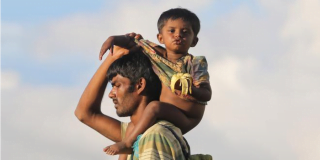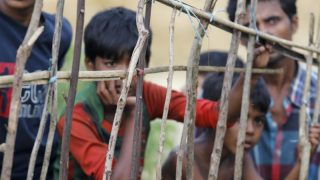Today’s Sydney Morning Herald led with a gut wrenching story about the remains of 800 children found in a sewerage pit in Ireland. These were children who died while institutionalised at ‘the Home’, a place to which unmarried women who fell pregnant were sent in the 1920s-1950s. A journalist whose research broke the story commented:
“When daughters became pregnant, they were ostracised completely. Families would be afraid of neighbours finding out, because to get pregnant out of marriage was the worst thing on Earth”
She recounts how, as a schoolchild she joined in taunting of “home babies”
Years after, I asked myself what did I do to that poor little girl that never saw a sweet? That has stuck with me all my life.”
Stories like this occur because of the narratives we construct about others, narratives that define them as other, stranger, “them” as opposed to “us”, undeserving.
When I was a child we constructed narratives around indigenous people that cast them as lazy and profligate, that astonishingly, suggested “they” were exploiting “us” by taking what were imagined as vast sums of “our” money in special benefits not available to “us”. Thankfully (hopefully?) our communities have recognised this as a false and dehumanising narrative.
For a long time I was heir to a false and dehumanising narrative around gay people, who were known to me as promiscuous, morally decrepit and dangerous to children. This narrative was used to justify the rejection of gay people, the legislating away of their human and civil rights.Thankfully (hopefully?) our communities have recognised this as a false and dehumanising narrative.
There were other false narratives that have been part of the communities in which I have lived and that inevitably shaped my narratives. These included narratives about migrants, Muslims, and people dependent on welfare. I was fortunate to be raised in a family that learned to question these narratives, repent where they had been held, and construct alternatives.
Today it’s asylum seekers who are subject to appallingly false narratives. How else do I explain the 2014 Lowy poll finding that 48% of Australians regard asylum seekers coming to Australia by boat as a “critical” threat to Australia’s interests? This can only occur because asylum seekers are cast as not genuine refugees but economic migrants, or worse, seeking an illegitimate entry to Australia, as people who are not of the kind we want living next door. Fed a steady diet of this by politicians and shock jocks, it seems the narrative of otherness is succeeding.
I reject this narrative and the dehumanising abuse of rights it justifies. I embrace a narrative that recognises almost all those arriving on our shores by boat are found to be refugees, that they have fled violence, false imprisonment, rape and other forms of persecution, desperately searching for that one thing we all want: safety, freedom from fear, and the opportunity to build a life. They are not a threat. They are my neighbour.







very moved about this.